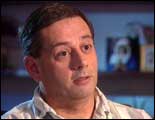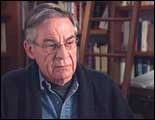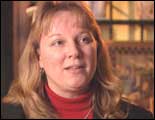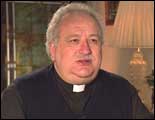Pedophile Priests
Interview by Lucky Severson and Bob Abernethy
Religion & Ethics NewsWeekly
February 22, 2002
Episode no. 525
http://www.pbs.org/wnet/religionandethics/week525/cover.html
BOB ABERNETHY, anchor: The Catholic Church has formally apologized for the sexual abuse of children by pedophile priests. The president of the U.S. Conference of Catholic Bishops, Wilton Gregory, cited the "immeasurable damage" done to children and their families. He promised the Church would take "all steps necessary" to protect children in the future.
 |
LUCKY SEVERSON: Joe Dulong says there's never a day he doesn't think about it.
 |
SEVERSON: Now, he says those same people put their arms around him. He told his mother what the priest was doing -- that was when he was only eight -- but it took her a long time to believe him.
Mr. DULONG: The molestation that took place started out gradually in my bedroom, and then it would be at campgrounds, or it would be on some side street.
SEVERSON: The priest was Father John Geoghan, now 66 years old and now defrocked, convicted of molesting a 10-year-old boy, accused of sexually abusing at least 130 boys and girls as young as four years old. The Archbishop of Boston, Cardinal Bernard Law:
 |
SEVERSON: There were other mistakes. Within the last few weeks, the diocese has released the names of 80 other priests accused of sexual abuse. What was once a closely kept secret within the Church has now become an explosive issue -- one that threatens the tenure of Cardinal Law, a senior leader in the Church and a friend of the pope.
Cardinal LAW: My apology to them and to their family and particularly those who were abused in assignments, which I made, comes from a grieving heart.
SEVERSON: It's not just here in Boston. Just in the past year, Catholic priests have been convicted, and the Church has settled cases, in Arizona, California, and Kansas. Over the past year, the Church has doled out hundreds of millions of dollars in settlements against pedophiles.
Richard Sipe is a psychotherapist and former Benedictine monk. He has been an expert witness in 57 child abuse cases against priests. And he estimates the Church has paid out a billion dollars in settlements.
 |
SEVERSON: It's the cloak of secrecy that angers Jim and Barbara Sacco the most. Barbara has been a devout Catholic all her life. Jim was one of Father Geoghan's victims -- he and his three brothers and sister.
(to Jim Sacco): Are you a different person because of it?
 |
SEVERSON: Are you bitter?
Mr. SACCO: Yes, very bitter.
SEVERSON: Who are you bitter at?
Mr. SACCO: The priest who did it to me. And the archdiocese for how they handled it.
 |
SEVERSON: The Boston diocese had known about Father Geoghan's pedophile tendencies since 1982. He was transferred from one parish to another and occasionally assigned to work with children whose parents were never warned. At least twice, he was committed to a treatment program and then pronounced cured.
Dr. SIPE: And the doctor was a good, really good Catholic guy and he respected priests and he loved priests and patted them on the back and said, "Doctor,'' I mean, "Father, don't do that anymore." And he left it at that.
Mr. SACCO: As children, we looked up to the priest as being very, you know, very much Godlike and they could do no wrong, and you know, everyone looked up to them. So for this to happen from a priest, it just compounded it.
Ms. SACCO: I would say it definitely affected his life. It has affected our life together just because of the way that he is because of this. He doesn't trust anybody. He doesn't get close to anybody.
SEVERSON: It's the lack of trust that may be hurting the Church as much as cash settlements. Father Dominic Grassi in Chicago says a few bad priests have tarnished the thousands of good ones, and he blames the Church in Boston.
 |
SEVERSON: Father Grassi says his job has become much more difficult.
Father GRASSI: A good pastor is close to people. Anything that gets in the way of creating that level of intimacy and that level of trust makes it difficult to pastor the people. It's harder than it used to be. Where things we took for granted we have to question, we have to watch ourselves. A hand on a back. A tousling of a child's hair.
SEVERSON: Father Grassi says most of the priests he knows are good men. There are others, though, who he says should have never been ordained in the first place.
Father GRASSI: We can't lower standards because we have fewer numbers. We can't look at our success by the number of men that are in our seminaries, which some dioceses are doing. In fact, there are some dioceses that accept men that have been turned down by two or three or four other dioceses.
SEVERSON: It's difficult to measure if priests are more prone to pedophilia than the general population. But there has always been speculation that the problem within the Church relates to celibacy.
Dr. SIPE: All the psychiatric literature will tell you that sexual deprivation can lead to picking a minor as a sexual partner.
SEVERSON: Here in this Boston suburb we spoke with a priest, a convicted child molester who says he underwent treatment 12 years ago and hasn't touched a child since. The priest did not want to talk on camera. He said he was also raped by his priest, but he blames his condition more on the Church's seminary system where, in his words, he was indoctrinated against the three "Ws" -- wine, women, and waltzing -- and against men. And then he found himself surrounded by adoring young boys.
Dr. SIPE: There is a structure within the Church that fosters immaturity. We're boys together, and the Church supplies all that. It is a kind of adolescent attitude, and there are those who turn to adolescents because of their immaturity.
 |
Mr. DULONG: I stayed with the Catholic Church, over the years. This molestation took place when I was a young boy, but after that I met some very vital priests that lived out their vows every single day.
SEVERSON: But many victims are like Jim Sacco , no longer a believer.
(to Mr. Sacco): How has it affected you spiritually?
Mr. SACCO: I don't go to church anymore. I don't go to any church.
SEVERSON: So you are not able to separate the individual from the church?
Mr. SACCO: No, I felt that the Church, him being a priest and what happened to me -- I kind of put them together, and so I have a very difficult time. And even to this day if I go into a church, I just don't feel right.
SEVERSON: Barbara Sacco says she still has a faith in God. But now she questions organized religion.
Ms. SACCO: How can I believe in something that has done this to so many children knowingly? They moved these priests around and exposed them to more and more children, and that just disgusts me. That they knew about this. How could they do that and sleep at night? How could you be in charge of an organization [and let] that happen?
SEVERSON: And then there are the other victims -- the priests, like Father Grassi, who feel the suspicious stares of the faithful who no longer trust the messengers.
Father GRASSI: I think what happened is a light that has been put in a dark corner, and we are starting to see what is in that dark corner. And we have to keep that light going.
SEVERSON: The Boston diocese has now handed over the names of the 80 priests accused of child abuse, and implemented new training and screening policies for priests -- a light glowing in a dark corner and a start along the path to redeeming the trust that has been betrayed.
I'm Lucky Severson for RELIGION & ETHICS NEWSWEEKLY in Boston.
ABERNETHY: Since the Boston tragedies became public,
neighboring dioceses in New Hampshire and Maine said they have given or
will give state prosecutors the names of priests there who have been accused
in the past of child sexual abuse.
Any original material on these pages is copyright © BishopAccountability.org 2004. Reproduce freely with attribution.